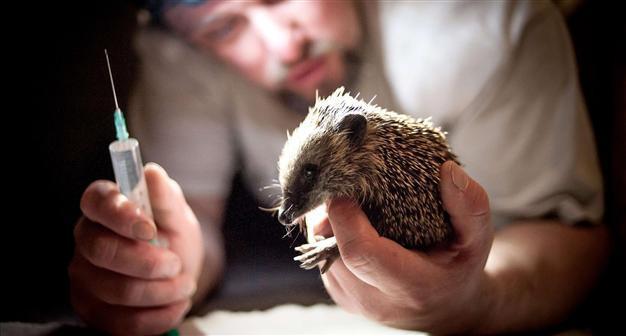In Poland, hedgehogs find a saviour
KRAKW, Poland - Agence France-Presse

Andrzej Kuziomski examines a hedgehog at the Kuziomski Igliwiak Foundation care center for hedgehogs in Krakow, Poland on June 30, 2014. AFP Photo
Too weak to stand on his feet after swallowing poison for garden slugs, Smoky the hedgehog is fighting for his life.
Thanks to a devoted Polish animal lover, he has a chance.
Andrzej Kuziomski set up Poland's first and only hedgehog shelter after as a bicycle courier he came across hundreds of the small, quilled mammals that had been killed or maimed in run-ins with humans.
"He hasn't eaten anything for days... He weighs less than half of what he should," the 45-year-old says as he holds Smoky, gently stroking his prickly back.
The refuge on the outskirts of Krakow has space for up to 50 sick or injured hedgehogs.
Driven from their habitat by rapid urbanisation and poisoned by the intensive use of insecticides, these omnivores have had little choice but to adapt to city life, while facing its mortal dangers.
Indeed, in parts of the capital Warsaw their numbers have exploded, forcing city authorities to install "Beware of Hedgehogs" signs.
But in reality, their distinctive protective quills are no match for car tyres.
Nor is their habit of rolling up into a ball, a defence mechanism used to foil predators.
Despite being a protected species, the hedgehog is at risk of disappearing from Europe within the next 20 years, Kuziomski warns.
Venturing into urban settings is their "last cry for help" as environmental factors squeeze them out of traditional habitats like forests and fields, he says.
"If we don't help them now, soon our children will only read about them in books," Kuziomski told AFP.
His passion for these prickly yet undeniably cute creatures began in 2007, when he plied the streets of Krakow as a bike courier.
"Every day, I saw dozens of hedgehogs squashed by cars. At night, I had nightmares. That's when I decided to do something," he says.
In cities and suburbs, hedgehogs are also "shredded by lawnmowers, mauled by dogs, or even burned alive by gardeners who set fire to piles of leaves that hedgehogs like to sleep in," Kuziomski adds.
He often finds them near death, poisoned by pesticides or herbicides, dismembered or burned, like one female he was given.
"She looked more like a roast chicken just out of the oven than a living animal," he recalls. "Thanks to several operations, she survived, but she will never be fit for release and will have to stay in the shelter until the end of her days."
Since 2010, Kuziomski says he has nursed back to health several dozen hedgehogs and then released them into the wild, far from cities and their many perils.
Consumed by his mission, Kuziomski says that like the nocturnal hedgehog, he has also become a creature of the night.
When the sun goes down, they wake up and he goes about feeding them, administering medicines, treating wounds and cleaning cages.
By day, he turns his energy to fundraising for Igliwiak, the foundation he set up to finance the sanctuary using his www.jeze.com.pl website.
Despite all the hard work and unsocial hours, Kuziomski's only regret is that he has too little free time to find and help more hedgehogs.
The sanctuary is run entirely on charitable donations and costs are high, especially for veterinary care and food -- around 70 kilogrammes (150 pounds) of worm larvae each month.
Veterinarians at a Krakow clinic are worried about Smoky.
"We'll feed him intravenously and try to detoxify his system," says Dr. Przemyslaw Baran after a thorough examination, adding: "I hope he makes it."
